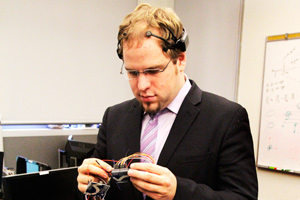FBIT faculty member talks about multiplayer games in PC Gamer magazine
March 3, 2014

Dr. Lennart Nacke, Director of the HCI Games Group with the University of Ontario Institute of Technology’s (UOIT) Faculty of Business and Information Technology (FBIT), was recently interviewed by PC Gamer magazine about why some multiplayer games are more engaging to some people than others.
Over the last several years, Dr. Nacke, who specializes in human-computer interaction (HCI), game design and affective gaming (biofeedback gaming using brain and body sensors), has run several studies investigating the emotional and social components of human behaviour during gameplay. His theory is that gameplay, especially social gameplay, is more than meets the eye. “Novel human-computer interfaces in games help us communicate better with the game world and express our feelings more accurately,” explained Dr. Nacke.
He also believes that video games themselves often act as interfaces or means of communication between other human beings. His studies show that games are a form of communication. In the article, Losing it: Why bad players keep trying with good games, he explained, “They (games) allow us to communicate with other humans by monitoring and comparing our behaviours in the game to others, and witnessing personal growth in an easy-to-understand, constrained environment.”
Dr. Nacke continues to utilize revolutionary physiological technology, such as brainwave and muscular sensors, to investigate the intellectual and emotional aspects of social gameplay. “Games, even the competitive ones, are one of the most social ways we can interact using technology today,” he said.
Learn more about Dr. Nacke’s research group by visiting the HCI Games Group website.